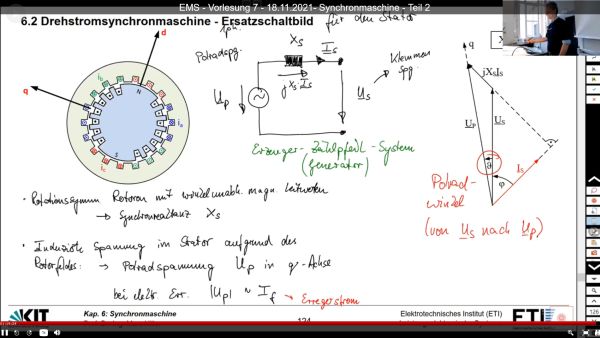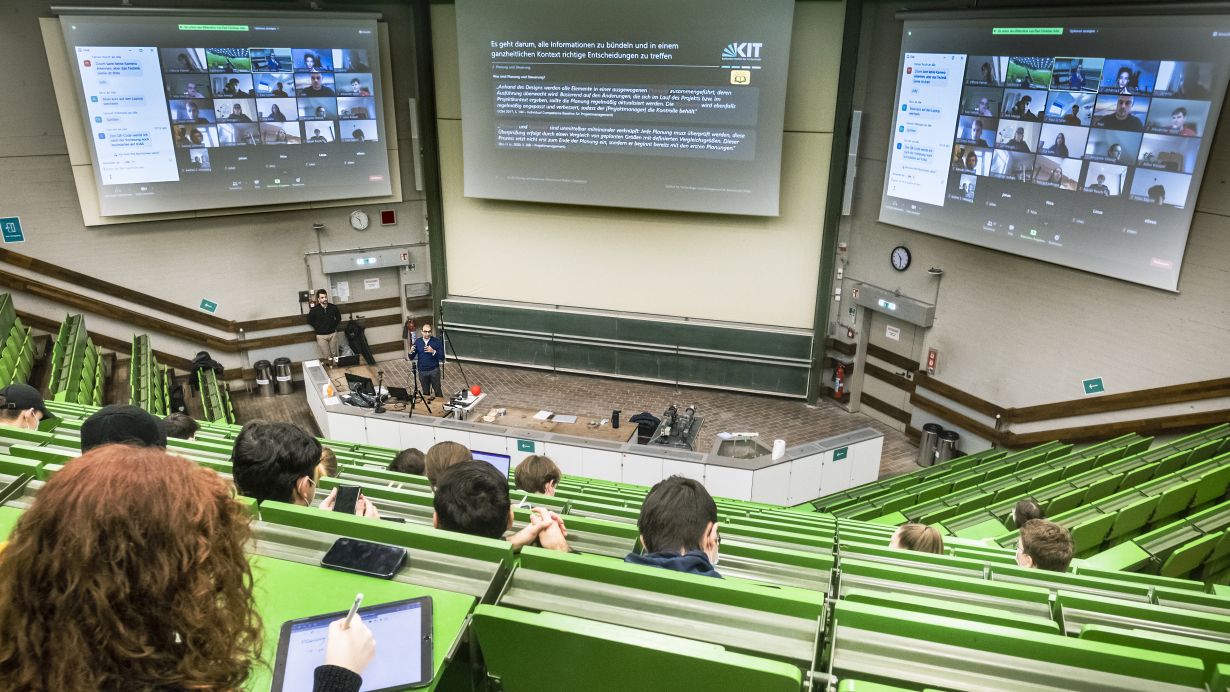In the current 2021/2022 winter semester, Karlsruhe Institute of Technology (KIT) has introduced hybrid offers that combine on-campus courses with digital participation. This is to offer as much academic education as possible on campus in spite of valid infection protection regulations and to enable all students to progress with their studies in this special situation.
After three online semesters, many courses and lectures have taken place on Campus South of KIT again since the beginning of this winter semester in October 2021. “This was the major concern of both students and teachers,” says KIT Vice-President for Higher Education and Academic Affairs, Professor Alexander Wanner. Some of the lectures that take place on campus can also be attended online by students from other places. This simultaneous, interactive live participation in courses and lectures via several media from various places is the principle of hybrid teaching. By means of these new hybrid teaching formats, participation is also possible for students who are presently living abroad, who are not yet fully vaccinated, or who are not permitted to attend due to quarantine regulations or COVID-19 typical symptoms. Presently, about one third of the lectures at KIT is offered in the hybrid mode. They complement the range of teaching offers that still includes on-campus courses, electronically provided teaching materials, and pure online lectures.
35 Lecture Halls of KIT Were Equipped with Additional Technology for Hybrid Teaching
“To me, it was of particular importance to be able to offer education on campus in this semester again,” says Professor Marc Hiller from KIT’s Institute of Electrical Engineering. His lecture on “Elektrische Maschinen und Stromrichter” (electrical machines and power converters) can be streamed live using the Zoom video conferencing software. After the lecture, the recording is made available to the students. The hall in which the lecture is given is one of 35 lecture halls of KIT, which were equipped with additional technology for hybrid education formats. During the complete lecture, a chat system is operated, by means of which students can answer each other’s questions. “I consider this chat function to be particularly enriching,” Hiller says. “The threshold to use it is much lower and students can answer simple questions quickly.” Instead of the blackboard, he uses a tablet, via which he cannot only present transparencies, but also edit them in writing. In future, he will use this method for all his lectures.

Creating a Sense of Community and Possibilities to Interact
For the first time, Professor Shervin Haghsheno from the Institute for Technology and Management in Construction is organizing his course on project management in a hybrid way. “Due to the special pandemic situation, I consider it very important to create conditions in this semester, by which all students are to be enabled to achieve good progress,” Haghsheno explains. By means of a second projection in the Zoom gallery view, students on campus and online can perceive themselves as a group. During the lecture, students are regularly asked questions. “Online students answer via Zoom live at the lecture hall,” Haghsheno says. “To make the questions asked by the students present audible in the livestream, we use a throwable microphone.”
Hybrid Concepts Will Make Studies More Flexible in Future
Of the about 150 students attending both lectures, two thirds took part on campus and one third remotely until mid-November. Since late November, this ratio has reversed. Hybrid academic education enables students to decide freely on how they would like to attend courses during the pandemic. Teachers can continue to organize their lectures as planned. “It was an advantage for all parties involved to also use hybrid teaching formats from the beginning of the semester,” Vice-President Wanner says.
Marc Hiller and Shervin Haghsheno can well imagine hybrid education even after the pandemic. The new hybrid or blended forms of learning will enable students to attend, if they will not be able to come to the campus. Moreover, the different ways of learning of the students can be considered much better. Hybrid courses and lectures have been rated mainly positively by the students. “For the students, it is much easier to organize their studies when they can decide flexibly on attendance,” Marc Hiller says. And the interactive participation features via chats or quizzes are also received well.
“Many teachers at KIT have specifically optimized existing options with high commitment,” Wanner says. However, exchange between teachers and students and among the students at in-person lectures remains of central importance to the latter’s learning success and personal development, he points out. “Our future challenge will be to find the best combination of in-person and online offers. In any case, we will build up on the experience gained with hybrid concepts now,” Wanner adds.
More information on hybrid teaching at KIT
In close partnership with society, KIT develops solutions for urgent challenges – from climate change, energy transition and sustainable use of natural resources to artificial intelligence, sovereignty and an aging population. As The University in the Helmholtz Association, KIT unites scientific excellence from insight to application-driven research under one roof – and is thus in a unique position to drive this transformation. As a University of Excellence, KIT offers its more than 10,000 employees and 22,800 students outstanding opportunities to shape a sustainable and resilient future. KIT – Science for Impact.

